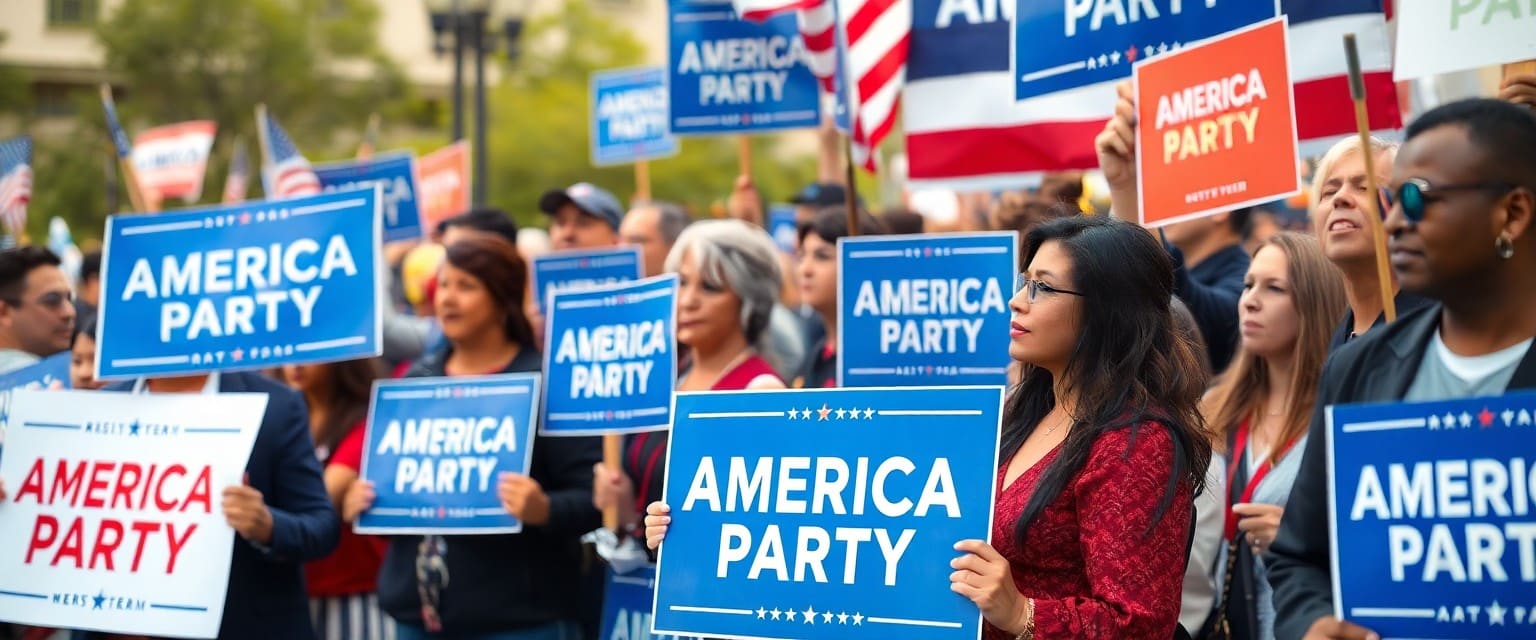There’s a significant development in U.S. politics you need to know about: Elon Musk has launched the “America Party” in direct response to what he calls a corrupt political establishment that no longer represents your interests. This announcement comes shortly after President Trump signed a sweeping $3.3 trillion “big, beautiful bill”, signaling rising tensions between Musk and the current political powers. As you consider the potential impact, it’s important to understand how this new party aims to challenge the two-party system and influence the future balance of power in Congress.
A Political Response to Partisan Discontent
The America Party emerges as a direct challenge to the entrenched two-party system that many feel no longer serves your interests. Sparked by widespread dissatisfaction, Musk’s entry into the political arena seeks to disrupt traditional power dynamics by offering an alternative that promises to hold both major parties accountable and introduce fresh perspectives into a gridlocked Congress.
Musk’s Critique of the Two-Party System
Elon Musk sharply criticizes the prevailing political landscape as a “one-party system” dominated by waste and graft, where both Republicans and Democrats perpetuate spending unchecked. Highlighting an informal X poll with over 1.2 million votes, Musk emphasizes that 65.4% of respondents want independence from the “two-party (or uniparty) system,” signaling deep voter frustration and a desire for meaningful choice beyond the existing duopoly.
The America Party’s Mission and Goals
The America Party’s key ambition is to establish a swing bloc in Congress capable of balancing power and blocking extremes from both sides. By focusing on targeted congressional seats, it aims to influence legislation, prevent budgetary excesses, and champion greater fiscal responsibility—redirecting political power back to voters through pragmatic and strategic policymaking.

Analyzing the ‘Big, Beautiful Bill’
Overview of the Legislation and Its Impact
The $3.3 trillion ‘Big, Beautiful Bill’ combines significant tax cuts, infrastructure investments, and stimulus measures aimed at boosting economic growth and national security. It allocates increased funding to border enforcement and Department of Homeland Security operations, while also addressing Medicaid system reforms to prevent state-level exploitation. This legislation represents one of the largest federal spending packages in recent years, designed to stimulate long-term investments yet sparking debate over its effects on the national deficit and fiscal responsibility.
The Bill’s Reception Among Different Political Factions
Reactions to the bill sharply diverged: fiscal conservatives and libertarians criticized the expansive spending and potential inflation risks, while many Republicans praised its strategic national security investments and tax relief components. Democrats were split, with some voicing concerns over immigration enforcement and others supporting the infrastructure elements. The legislation’s passage highlighted the ongoing tensions within and across party lines, reflecting varying priorities and ideological divides.

The Timing of Musk’s Announcement
Elon Musk’s decision to launch the America Party immediately after President Trump signed the $3.3 trillion “big, beautiful bill” signals a clear political statement. With the bill incorporating expansive tax cuts and stimulus spending, Musk’s timing underscores his growing discontent with the current bipartisan approach to fiscal policy. This move strategically capitalizes on the legislative moment, positioning his new party as a direct response to what he perceives as unchecked government spending and a failing two-party system.
Correlation Between Trump’s Policies and America Party Formation
The formation of the America Party appears intertwined with Musk’s skepticism toward the fiscal directions taken by both political parties. Though he hasn’t openly condemned Trump’s bill, Musk’s critique of government waste and graft hints at discomfort with such large-scale spending packages. This suggests that Musk’s initiative aims to counterbalance policies like the “big, beautiful bill” by promoting fiscal responsibility and combating entrenched political interests he believes neither major party adequately addresses.
Public Sentiment Reflected in Musk’s Poll
The July 4 poll Musk conducted on X revealed significant public appetite for political change, with over 1.2 million votes cast and a decisive 65.4% majority favoring independence from the two-party system. This overwhelming response empowers Musk’s claim that Americans are frustrated with current political dynamics and eager for a new option that delivers genuine representation and freedom from partisan gridlock.
While the poll’s informality and vulnerabilities—such as being open to non-U.S. voters and bots—might limit its scientific precision, the volume and trend are telling. It captures a broad dissatisfaction among voters who feel alienated by entrenched parties, validating Musk’s rationale for launching the America Party. Despite traditional barriers third parties face, the poll highlights a palpable desire for alternatives that could reshape the political landscape if harnessed effectively.
Assessing the Viability of a Third Party
Launching a new political party like the America Party faces steep structural hurdles embedded in the U.S. electoral system. With strict ballot access laws, a winner-take-all Electoral College, and immense funding challenges, third parties rarely secure lasting influence. However, targeting a few key Congressional seats to form a swing bloc could provide a foothold, enabling you to disrupt the dominance of Republicans and Democrats. Success depends on leveraging voter dissatisfaction while navigating institutional barriers designed to preserve the two-party status quo.
Historical Challenges for Third-Party Candidates
Third-party bids have repeatedly struggled due to systemic obstacles. Ross Perot’s 1992 presidential run won nearly 19% of the popular vote yet failed to capture any Electoral College delegates, illustrating the steep climb third parties face. Candidates like Ralph Nader and Gary Johnson garnered significant attention but couldn’t translate that into electoral victories. Factors such as limited media coverage, scarce fundraising, and difficulty securing ballot access often doom these efforts before they gain momentum.
Potential Effects on Future Elections and Voter Dynamics
The appearance of a viable third party could reshape election outcomes by siphoning votes from major parties, particularly conservatives, potentially easing Democratic paths to victory. You might witness an evolving voter landscape where disillusioned constituents seek alternatives, but this risks splitting coalitions and weakening aligned efforts. The emergence of a swing bloc could disrupt legislative dynamics if it grows influential enough to hold the balance of power between Republicans and Democrats.
Expanding on voter dynamics, a third party focused on specific congressional districts might leverage local dissatisfaction to win seats, affecting the national balance. By diverting votes primarily from the right-leaning base, this could inadvertently strengthen Democratic candidates in tightly contested races. Your actions may encourage more strategic voting or push major parties to alter platforms to recapture drifting supporters. While potentially fragmenting traditional voting blocs, the America Party might also invigorate political engagement among voters frustrated with existing options.
Reactions from Political Figures and the Public
The announcement of the America Party stirred immediate and mixed responses across the political spectrum. Established figures and everyday citizens alike weighed in, with many expressing both hope for renewed political representation and concern over potential vote splitting. Social media hosted vigorous debates, reflecting deep skepticism about the viability of a new political force amidst entrenched two-party dominance. At the same time, some saw Musk’s initiative as a bold step toward disrupting a system they view as stagnant and unresponsive.
Support and Skepticism from Conservatives and Liberals
Conservative voices expressed worry that Musk’s America Party might fracture the right-leaning electorate, potentially handing advantages to Democrats, as conservative commentator Shawn Farash cautioned. Meanwhile, some liberals remained wary, questioning whether the new party would genuinely challenge establishment politics or simply siphon moderate votes. Calls also arose from within the GOP urging Musk to channel his efforts into reforming the party from within, reflecting doubt about the feasibility of a fresh political entity gaining durable traction.
Commentary on Musk’s Influence and Resources
Elon Musk’s vast personal wealth and prominent public platform uniquely position him to elevate the America Party’s profile quickly. His control over X, with millions of users, offers a powerful channel to galvanize supporters and spread the party’s message efficiently. Yet, even with such resources, Musk faces the daunting challenge of overcoming America’s institutional barriers to third-party success, including the Electoral College and ballot access laws that historically stifle outsider movements.
Leveraging assets like SpaceX’s high-tech innovation reputation and Tesla’s global brand, Musk combines entrepreneurial success with unparalleled media attention, giving the America Party an initial advantage rarely afforded to third-party contenders. However, the party must translate Musk’s spotlight into tangible organization, candidate recruitment, and voter outreach across diverse districts. The question remains whether his influence can surmount systemic obstacles long embedded in U.S. electoral politics or if this venture will struggle to move beyond a high-profile experiment.
Final Words
Following this, you witness a significant moment as Elon Musk launches the America Party, challenging the longstanding two-party system just after President Trump signed the landmark bill. This move signals a push for political alternatives aiming to disrupt the status quo and offer you options beyond traditional party lines. While obstacles remain for new parties in U.S. politics, Musk’s initiative invites you to consider how evolving political dynamics could reshape future elections and your role within them.

